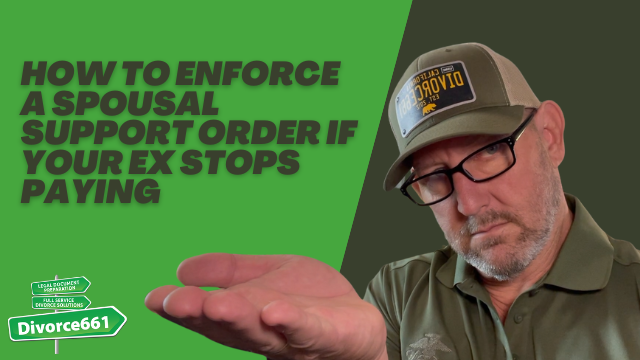How to Enforce a Spousal Support Order If Your Ex Stops Paying
When it comes to spousal support, many individuals find themselves in a tough spot when their former partner stops making payments. If you’re in California, it’s crucial to know that spousal support orders are legally binding court orders. This means that if your ex-spouse is not paying, they are violating this order, and you have the right to take action. Let’s dive into how you can enforce a spousal support order effectively.
Understanding the Legal Foundation of Spousal Support
Once spousal support becomes part of your divorce judgment, it transforms into a legally binding court order. This order is not merely a suggestion; it is a requirement that both parties must adhere to. If your ex stops paying, it is not just an inconvenience for you; it’s a breach of a court order, and you are entitled to take action.
Taking Legal Action: The First Steps
The first step in enforcing your spousal support order is to file a Request for Order. This is a formal legal document that allows you to request back payments and even add interest to the amount owed. Fortunately, the process is straightforward and can yield significant results.
Filing a Request for Order
When filing a Request for Order, it’s essential to gather all necessary documentation. This includes proof of the original support order, any payment history, and communication attempts regarding missed payments. This paperwork will help build a strong case for why the court should enforce the order.
Exploring Your Options: Wage Garnishment
One powerful tool you can utilize is wage garnishment. By requesting wage garnishment, you ensure that payments are deducted directly from your ex’s wages. This approach makes it significantly harder for them to skip payments, as the funds will be taken directly from their paycheck before they even see it.
A Real-Life Success Story
Consider the case of one of our clients who faced over a year of unpaid support. After we filed an enforcement motion, the court ordered wage garnishment with added interest on the unpaid amount. As a result, payments resumed immediately, showcasing the effectiveness of taking legal action.
Why You Should Take Action
Taking action is crucial not only for recovering past payments but also for ensuring future compliance. When a court enforces the support order, it sends a clear message that non-payment will not be tolerated. This can often encourage the non-paying spouse to resume payments promptly.
What Happens If Contempt Is Found?
In serious cases, if your ex continues to refuse payment, the court may hold them in contempt. This can lead to serious consequences, including fines or even jail time. Understanding this risk can be a motivating factor for your ex to comply with the court order.
How Divorce661 Can Help
At Divorce661, we specialize in preparing and filing enforcement motions, gathering all necessary documentation to support your case. Our team understands the intricacies of family law and is dedicated to ensuring that your rights are upheld. We offer a flat-fee service with a fast turnaround and professional support.
Ready to Get Started?
If your ex has stopped paying spousal support, don’t hesitate. Visit Divorce661.com for a free consultation. We will help you recover what you’re owed—legally and effectively.
Common Questions About Enforcing Spousal Support
What if my ex claims they can’t afford to pay?
If your ex claims financial hardship, it’s essential to document everything. Keep track of all communications and payment records. You may also want to consider mediation to discuss the possibility of modifying the payment amount temporarily.
How long do I have to take action for non-payment?
It’s crucial to act quickly. In California, you generally have three years to enforce a support order after the first missed payment. Delaying action can complicate your case.
Can I receive interest on unpaid support?
Yes, when you file a Request for Order, you can request that interest be added to the amount owed. This can significantly increase the total amount you recover.
What should I do if I receive pushback from my ex?
If your ex is resistant to complying with the court order, it’s vital to consult with an experienced attorney. They can guide you through the enforcement process and ensure your rights are protected.
Conclusion: Take Control of Your Financial Future
Dealing with non-payment of spousal support can be frustrating and stressful. However, knowing your rights and the legal avenues available to you can empower you to take action. Whether you choose to file a Request for Order, pursue wage garnishment, or seek contempt charges, you can reclaim control over your financial future.
Don’t hesitate to reach out for help. The team at Divorce661 is here to support you every step of the way. Contact us today for a free consultation, and let’s work together to ensure you receive the spousal support you’re entitled to.

